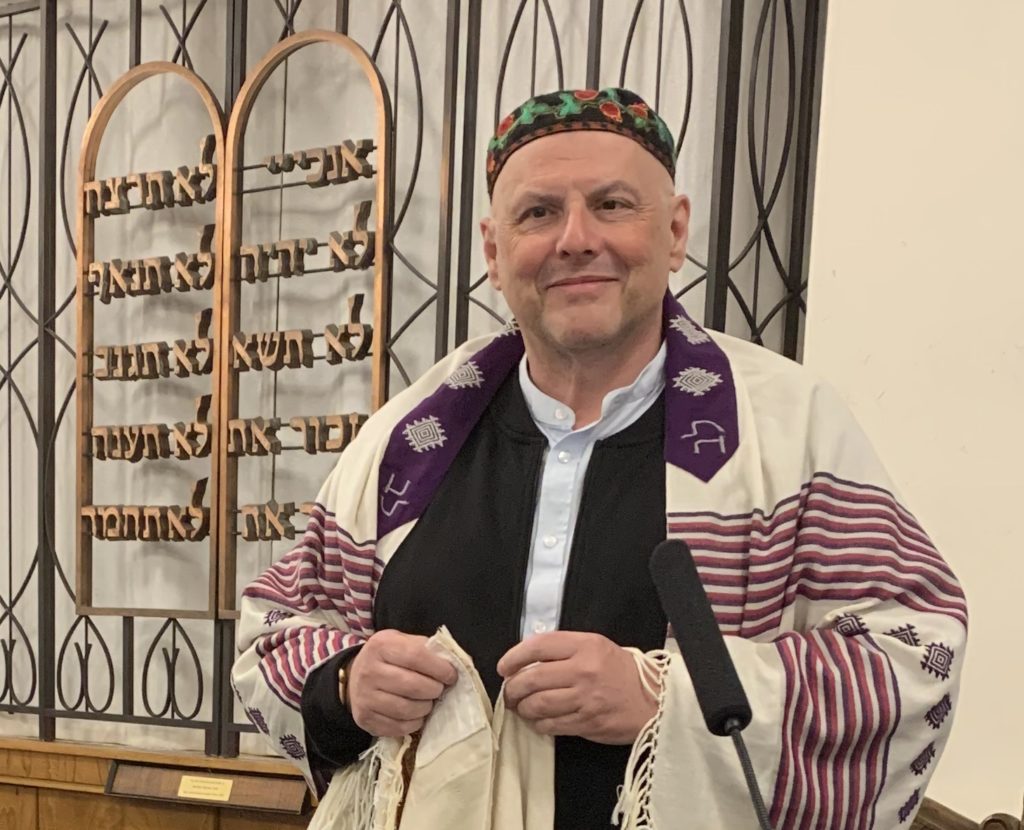Rabbi René’s Erev Rosh Hashanah sermon
Levi Isaac of Berditchev, a Chasidic master who lived in the 18th century told the following story.
“A king went hunting in the forest. He got deep into the forest and could not find the king’s highway that would lead him back to the palace. Seeing some countrymen, he asked them the way, but they could not answer him, because they did not know it either. Finally, he found a wise man, and asked him the way. Realizing who the king was, the wise man trembled and showed him to the highway, for he knew the way. So, he led the king back to his kingdom. Now the wise man found great favour in the eyes of the king, who lifted him above all the lord of his kingdom, and clothed him in costly garments, and ordered his old clothes to be laid in the king’s treasure house. Sometime afterwards, the wise man sinned against the king, who grew angry and commanded the lords who stood highest in his kingdom to judge the man as a transgressor against the king’s commandment. Then the wise man was very distressed, for he knew they would decide against him. So, he fell on his face before the king and pleaded for his life and asked to be allowed before the verdict to put on the same clothes he had been wearing when he had led the king out of the forest. The king accepted his request. And it came to pass, when the wise man had put on those clothes, that the king recalled the great kindness that the wise man had done him by returning him to his palace and to his royal throne. The king’s compassion was kindled, and the wise man found grace and kindness in his eyes, and the king allowed his sin to pass unpunished, and returned him to his possession”[1].
It is the story of a king who, despite his great power, can get lost in his own forest. This mighty man does not have all the keys to unlock the different steps of his journey. What a lesson in humility.
It is also the story of a wise man who, despite all his wisdom, can be prone to sin, goes astray and loses sight of his moral compass. He trembles before the king because he knows that he is fallible and that his fate lies in the king’s hands. The king is the source of justice and fame. One can be lifted to the highest functions of the realm, but the fall is not far away.
And what about these old clothes? You would have thought they would simply be thrown away. The king, we are told, clothed the wise man in costly garment. And he chose to keep the old clothes in his treasure’s house. And when the wise man goes to trial for his sin, he requests to wear them. Upon seeing those old pieces of clothes, the king decided to show compassion and to forgive the wise man, because he remembered the circumstances of his first encounter with the wise man.
The High Holy Days season is called in Hebrew Yemei ha-Teshuva, the Days of Return. As the prophet Hosea declared, “Return, O Israel, to the Eternal your God” (Hos. 14: 2). The old clothes in our story symbolize this act of returning. They triggered the memory of a moment of profound connection between the king and the wise man, a moment when this powerful man needed the help of one of his humblest subjects. There are times in our life when our path collides with another human being, when we get – or offer – assistance, whether a hand, some advice, a word of comfort, that helps us to go back to our inner palace. Teshuva heals. The healing is in the return.

I came across this expression while listening to a podcast from the On Being Project, a podcast that explores what it means to be human, how we want to live, and who we will be to each other. I can only highly recommend this podcast, launched in 2003 by the amazing Krista Tippett, first under the title “Speaking Faith”, and then “On Being”.
She recently interviewed Sharon Salzberg, a Buddhist teacher and author, co-founder of the Insight Meditation Society. Sharon Salzberg comes from a Jewish background, and then moved early on to Buddhism after a trip to India in the 1970s.
Reflecting on 2020, the year of the pandemic, they ask the question, “how do we keep walking forward, and even find renewal along the way?”[2]. 2020 was a year of rupture, and on this season of High Holy Days, asking how to find meaning in such a time, how to move forward, is crucial, essential. Sharon Salzberg says, “it’s such a huge capacity of our hearts to see what we’re going through, to see what others are going through, and to just have this perspective of it, to see there is change in life, and there is light in the darkness and darkness in the light. And we’re not avoiding pain, because some things just hurt”.
We cannot avoid pain, loss, or trauma. That is part of life, but we can choose love as a response, first loving ourselves, and from that love, building up the conditions to love others and the world.
The first lesson in life is that healing is in the return. We may feel anxiety, grief, anger, exhaustion, but the actual point to overcome those emotions, learning how to let go more gracefully. Learning how to start over with some compassion for ourselves, instead of judging ourselves so harshly. The truth is, or more accurately, the harsh truth is, we can’t often change the circumstances that are in front of us, but we can change our experience of them. That perspective is in itself a liberation.
But what makes change so difficult? Let’s travel for a moment to ancient Greece and consider the Greek word Nostos. In ancient Greek literature, Nostos describes a hero returning home by sea. It is usually a very complex and challenging voyage, such as the one that Odysseus narrates, but the result is, beside coming home physically, gaining an elevated sense of the self. Nostos is return, but to a better self.
In the 17th century, a Swiss medical student, Johannes Hofer, coined the medical term “nostalgia”, combining nostos, return, with another Greek word, algos, meaning pain, to describe the psychological condition of longing for the past. Returning to one’s past can be a testing experience. One may not like what we see. One may wish to leave old traumas in the past. One may also regret a period of life that is perceived as more fulfilled. The past can imprison us, but we cannot forget it. We are drawn to revisit over and over, so how do we avoid the pitfalls of pain and mental jail?
In the podcast I’ve mentioned earlier, Sharon Salzberg quotes a teaching from the Buddha that resembles a prayer we say in the morning, the Mode Ani. The mind is naturally radiant and pure. The mind is shining. It’s because of visiting forces that we suffer. Among these visiting forces are greed, hatred, jealousy, fear. But these visiting forces don’t make us bad people. They make us suffer if we resist them and let them overcome us.
Certain habits of mind increase suffering. Sometimes, we develop survival mechanism, that may help us for some time, but are actual hindrances. We can get attached to things or people, clinging to things familiar and refusing to let them go. We can also feel extreme anger, or fear. Another habit, or survival mechanism is sleepiness, which is a kind of numbness when we face a challenge. How often do we avoid tackling a difficult situation? It is indeed very tiring. The energetic opposite of numbness is restlessness, agitation, and anxiety. We can’t find peace. Our heart races, our mind cannot rest. We can also doubt, doubt about ourselves, about the others or the world. And what about cynicism, which is another form of doubt? Some kinds of doubts are priceless, because they push us to question, and not to accept someone else’s views. But cynicism comes when we have decided not even to try to understand, but to stand aside and scoff. We have lost any hope that things may improve.
Eventually, all these survival mechanisms create suffering. We are detached from our true selves, from the energy of life that resides in all of us. We cannot return to the source of our being, and we give in to despair.
The solution is surprisingly simple. These visiting forces are real, we cannot pretend they do not exist, so instead of fighting them, let us welcome them as part of our mind for what they are, mere mechanisms, observe them, and let us not allow them to overwhelm us.
I would like to finish with a poem composed by Sharon Salzberg.
“I do the best I can.
I try to learn from my mistakes.
The world is the world of constant change
and pleasure and pain,
and being thanked and not being thanked –
all of those things.
And so, that’s where equanimity – serenity – comes in
as a kind of comprehension
of: this is the way things are”.
Healing is simple. Healing is in the return. Equanimity, or serenity, fills us when we go back to the core of our being, when we accept who we are and what we are, without complacence, but more importantly with compassion.
May this New Year be a year of awareness of our frailties and strengths, but also an awareness of our successes and failures. That is the only way to heal.
[1] In : S.Y. Agnon, Days of Awe, 1995 ed., pp. 64-65.
[2] https://onbeing.org/programs/sharon-salzberg-the-healing-is-in-the-return/
